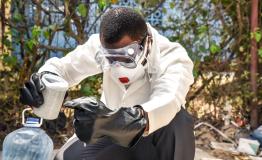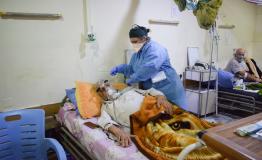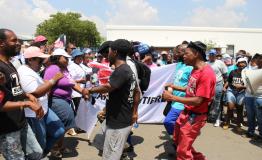

Iraq
Doctors Without Borders (MSF) responded to multiple health emergencies across Iraq in 2020, providing care to thousands of people displaced by the war against the Islamic State group, protesters injured in violent clashes with security forces, and patients with COVID-19. We also supported the national health system, which is still in the early stages of reconstruction, by filling gaps in essential healthcare.

80,900
80,9
69,100
69,1
15,800
15,8
14,400
14,4
Supporting emergency preparedness
The mass demonstrations that started at the end of 2019 continued into 2020, prompting MSF to launch an emergency intervention in Najaf, Dhi Qar, and Basra governorates to respond to an increase in the number of patients with violence-related injuries.
In Najaf, we ran training in mass casualty planning at three local hospitals to help staff deal with a sudden influx of patients. In Nasiriyah, our teams supported the emergency room of Al-Hussein hospital with training on trauma care, focusing on critical injuries and resuscitation.
Teams in Basra provided training on emergency preparedness at a city level, as well as trauma training for paramedics, in collaboration with the Department of Health.

4,480
4,48
COVID-19 response
As many health facilities damaged in recent years have yet to be rebuilt or rehabilitated and returned to full capacity, and there is a shortage of specialised healthcare staff and drugs, it was immediately clear that the health system would struggle to cope with the increased needs and challenges generated by the pandemic.
We, therefore, decided to maintain our lifesaving medical activities while strengthening infection prevention and control measures and putting in place triage and referral procedures to protect our patients and staff.
In Baghdad, the city hit hardest by the virus, we supported Ibn Al-Khateeb hospital, a facility run by the Ministry of Health. When it was identified as one of the three main hospitals for COVID-19 care in the early stages of the pandemic, we sent a team to train medical staff on patient triage and infection prevention and control.
We also supported the capital’s Al-Kindi hospital by treating patients with severe cases. At the beginning of the outbreak, our staff worked in the hospital’s respiratory care unit (which included beds for patients in intensive care). Later in the year, we opened our own 24-bed ward, and then gradually moved to a 36-bed ward in a purpose-built wing.

MSF COVID-19 response in Mosul
MSF COVID-19 facility in Mosul: Patients are referred to MSF from Al Shifaa hospital for infectious diseases in Mosul, which was previously donated by MSF, now operated by the Ninewa Directorate of Health. MSF teams provide patients with treatment, health promotion, and mental health support in our facility.
We also supported the response to the outbreak in Mosul, in Ninewa governorate, temporarily transforming our 64-bed post-operative care facility in the east of the city into a COVID-19 treatment centre for suspected and confirmed cases.
In mid-November, we opened an additional 15-bed intensive care unit at Al-Salam hospital to offer advanced care for patients with critical and severe forms of the virus. At other facilities in Ninewa, as well as in Erbil, Diyala, Kirkuk, and Dohuk governorates, we provided training sessions, with a focus on infection control.
In addition, we set up a 20- bed isolation unit and treatment facility at Laylan displacement camp in Kirkuk, in preparation for a potential spike in COVID-19 cases.
Essential healthcare for vulnerable communities
In the rest of the country, we continued to run general and specialist health services at our ongoing projects for displaced people, returnees and vulnerable communities. In all locations, including our COVID-19 centres, we maintained our emergency room and mental health services.
As a result of the pandemic and the closure of private clinics, our maternity and paediatric teams in west Mosul and Sinuni saw a sharp increase in demand for care and admissions.
In Ninewa, we provided emergency and intensive care, burns treatment, physiotherapy, and mental healthcare at our hospital in Qayyarah, until October, when we handed over all our activities to local government hospitals.
As part of the process, we trained staff and donated medical supplies and other equipment. Until October, at the Qayyarah displacement camp, MSF also offered general healthcare, maternity services, and treatment and follow-up for non-communicable diseases, until we handed over our activities to another organisation.

COVID-19 ward in Al-Kindy hospital, Baghdad
Al-Kindy hospital, in Baghdad, is receiving large numbers of severe and critical COVID-19 patients. Since July 2020, MSF teams have been helping in the respiratory care unit (RCU) providing bedside training for staff including ventilation use, drug use, and techniques adapted for the treatment of COVID-19.
We also had teams working in general healthcare centres in the towns of Hawija and Al-Abasi in Kirkuk governorate, and in Sinsil Al-Muqdadiya in Diyala governorate, where we supported maternity services, sexual and reproductive healthcare, treatment for non-communicable diseases, health promotion, and mental healthcare.
Our general healthcare services were also available in Laylan camp (Kirkuk), until its closure in November, and in Alwand and Sinsil camps (Diyala), until August, when MSF handed over these activities to the Department of Health and other organisations.
In Baghdad, MSF continued to collaborate with the national tuberculosis (TB) programme, with the introduction of a new, more effective oral treatment for drug-resistant TB.
Due to the COVID-19 outbreak, we were forced to temporarily suspend our activities at the Baghdad medical rehabilitation centre, where people injured in violent incidents or accidents receive comprehensive care, including mental health support.
However, we were able to maintain our support to patients through online physiotherapy and mental health consultations, for example using Skype, and restarted activities later in the year.
No. staff in 2020: 1,076 (FTE) » Expenditure in 2020: €38.7 million MSF first worked in the country: 2003


MSF challenges COVID-19 myths with new quiz challenge app

Iraq: COVID-19 outbreak in Baghdad is "very alarming"

Bodies at War, at the crossroads of fate and war in the Middle East

MSF and TB activists disrupt opening of TB conference to protest drug corporations keeping life-saving medicines from people
